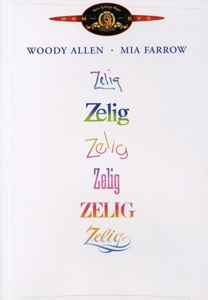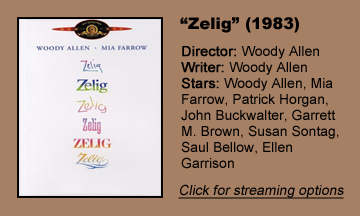“Zelig” (1983) initially seems to be a case of one joke – that Leonard Zelig (Woody Allen) has chameleon abilities that allow him to blend in with any crowd – taken too far. But this faux-stodgy-documentary is so appealingly dry as Zelig’s situations become more extreme, and the technical achievements are so impressive, that the 79-minute gag doesn’t seem too long.
Influential faux-documentary
The premise predates films that, to a degree, borrow it. Forrest Gump would later pop up in key historic events. Still later, Borat would stumblingly comment on culture and society while making documentaries. The faux-documentary idea was fresh at the time of “Zelig.” It’s more old hat today, but this remains an admirable film.
It’s a showcase of Allen’s premise-creating and writing skills more so than his acting, although the fact that he plays the title character nudges us to chuckle out of the gates.
Sometimes I can see Allen teeing up a joke, such as in Zelig’s audio interview with his psychologist, Dr. Eudora Fletcher (Mia Farrow), where he does a variation on his penis envy joke from “Annie Hall.” Freud is among the people with whom the Gumpian Zelig – himself a psychologist – has crossed paths.
The narrative sometimes doubles back on itself, repeating the joke of Zelig disappearing for stretches at a time. But Allen usually comes up with a good payoff to each of Zelig’s reinventions as he moves through the 1920s and ’30s. At one point Zelig joins the Nazi Party as an ideal way to blend in. At various other times, he’s a Jew, a Native American and a black man, making him a “triple threat” to the KKK, as the deadpan narrator (Patrick Horgan) puts it.
“Zelig” comments on conformity, racism and collectivism in obvious ways; indeed, interview subjects — among them a present-day Fletcher (Ellen Garrison) and a handful of famous people playing “themselves” – flat-out say Zelig’s condition and experience are metaphors for what we all go through.
Presentation adds zest
The presentation adds zest, though. Here, Allen doesn’t merely get to use music from his favorite decades, he gets to immerse himself in the time period, as he’d also do soon after this in another strong work, “The Purple Rose of Cairo.” Meanwhile, the matte artists, compositors and editors craft what looks like a normal, professional documentary.
When Zelig appears in “footage” with historical figures, it’s seamless, and all the new footage is made to look like the era of the old clips. Dick Hyman adds new “period” music where singers cash in on the public’s curiosity about Zelig, such as the earworm “Chameleon Day,” presented with the crackle of an old record player.
As unusual as “Zelig’s” premise and structure is, it’s easily accessible. The jokes’ themes will be comfortably familiar to fans of Allen’s comedy. The final laugh line sums it up nicely. Zelig is hailed as a hero for escaping the Nazis by immediately picking up flying skills from Louise (as per his condition). In his homecoming speech, he says: “I’ve never flown before in my life, and it shows exactly what you can do, if you’re a total psychotic!”

The novelty value of a faux-documentary has worn off with time, so what might have been a towering technical achievement in 1983 plays more like a trifle now. But “Zelig” is an endearing one, as Allen has a blast approaching his comedy from a fresh angle.


